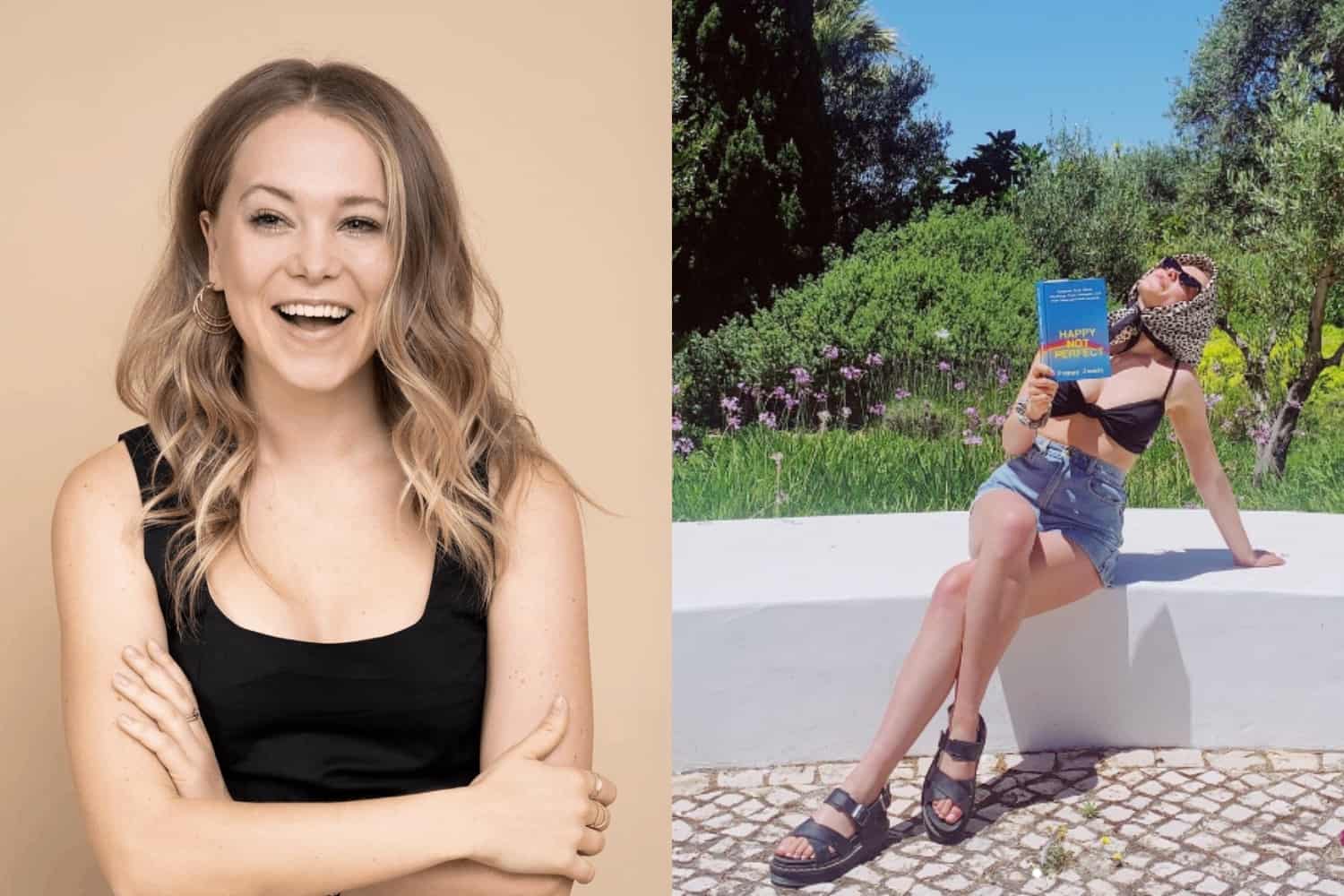Poppy Jamie has one incredibly robust resumé—entrepreneur, podcast host, former TV personality, accessories brand co-founder, TED talker, Forbes 30 Under 30 awardee, mental health activist, and, most recently, author are all among her career talking points. Her debut book, ‘Happy Not Perfect’, which is available for purchase today, explores and offers an approach to mental wellness. We chatted with the multi-hyphenate about her own wellness journey, the pressures of social media, the power of flexible thinking, and the making of her brand.
Where did you grow up and how did you get your start in TV?
I grew up in England with a psychotherapist mother and entrepreneurial father who suffered [from] anxiety and stress. I learned early on how mental health had the power to not only affect the person experiencing, but also how contagious emotions were. Since I could speak, I wanted to work in television because I loved how television hosts were like teachers, sharing information and telling fascinating stories.
What are some other early career highlights?
I think presenting my first TED Talk at 25-years-old was a real highlight, and then a few years later being awarded a Point of Light award by the Prime Minister of England for my work in mental health. My most recent career highlight probably has to be my new book! I still can’t believe it’s coming out.
Let’s talk about your app, Happy Not Perfect. What led you to create this platform?
After experiencing so many family mental health struggles, when my own anxiety and stress started to become unmanageable in my mid-twenties, I realized there were so few tools out there to help people. Therapy is expensive and I have always been lucky to lean on my mum for help, so in the middle of one of my worst days I suddenly thought, ‘Why don’t I try to create an app that acts like a psychotherapist, asking you questions, helping you to process thoughts and encouraging you to change your perspective? Why don’t I try to put my mum in an app?’ Happy Not Perfect is now nearly four-years-old and it has many different mental health workouts in the app—from a happiness workout, sleep wind-down, and manifesting workout. I was really keen to create a mental wellness platform that was interactive: something everybody could do and that was also fun! Looking after our mind doesn’t have to be boring, but if we are really committed to changing the way we feel on a long-term basis, we need to get into the habit of looking after our mind daily. The HNP [platform] was built to help you to do that.
View this post on Instagram
For those who aren’t familiar with it what does the app offer and for who is it for?
It’s for anyone who struggles with meditation and wants to care for their mind. If you want to sleep better, feel happier, or manifest your best future, the app has gamified workouts for you!
Congratulations on your book “Happy Not Perfect”! How long has this been in the works?
The book has been about six years in the works. I have combined all my research from world-leading experts to give readers all the tools that helped and transformed my life. I wanted to ensure everybody else could learn the same very things that altered my perspective on how I saw the world. The book takes you through a journey from stiff thinking into flexible thinking. When I learned about flexible thinking, suddenly every challenge I faced was manageable and every self-critical thought questionable. When you become a flexible thinker, you can free yourself from the past and the thoughts that keep you trapped. Do you enjoy the process of writing and find it therapeutic?
Yes, I haven’t ever felt so happy when I was writing this book. It is a true privilege to share with other people and I hope readers also feel the same level of liberation I did.
We live in a world that’s largely driven by the need to be, or seem, “perfect”. How do you personally overcome and deal with that pressure in your own life?
The illusion of ‘perfect’ is so toxic and it’s everywhere. Every time we arrive on social media we are reminded of unrealistic expectations and ideals, and it’s very easy to become absorbed by it. But I remind myself constantly, ‘What is meant for me, will not pass me by.’ Everything is unfolding in absolutely the right way for each and every one of us, and all we need to focus on is being our most authentic selves. When my perfectionist inner critic pipes up, I challenge the voice telling me things need to be ‘better,’ and instead invite self-compassion to the conversation. I ask myself questions like, ‘What would I tell a friend experiencing what I am now?’ This taps into the wise part of my brain and nurtures kindness over killing myself to be ‘better.’
View this post on Instagram
You often say “comparison is the thief of joy”—what role does comparison play in our day-to-day lives these days?
There will always be someone more intelligent, more successful, prettier, more well liked…and so, if we allow comparison to take over, we will always believe less of ourselves. When we compare, we forget our unique strengths and instead focus on our shortcomings. Comparison drowns out gratitude and appreciation for what we do have, by concentrating on what others have instead. Our sense of self can start feeling degraded and this can happen in all arenas in life from friends to romance to work. To counter comparison, remember to ask yourself: ‘What can I feel grateful for today?’, ‘What qualities do I appreciate about myself?’, ‘How can I share some kindness towards someone else today?’ Shift the focus away from comparing yourself to others and onto what you appreciate and how you can help.
What advice would you give to someone who’s busy with their career and overwhelmed by a tightly-packed schedule?
Pause. You will always make a better decision after you’ve slowed down. Being busy is an illusion. Prioritize, say no, and focus on the things that really matter and are going to take you to the next step. If you don’t know what those things are, slow down and find more clarity. I would also read my book because I was a chronic over-scheduler, ‘busy bee,’ and it only led me to one destination: a health crisis with no self-esteem. I would hate for anyone else to experience the same and the book shows you an alternative path!
How would you describe your style?
I’m not sure how I would describe my style, as it changes. I wear what I want. So, at work, I wear a lot of oversized suits to embrace my masculine energy. For fun, I love a mini-dress, and for the evening, I love loose dresses. I adore dressing up. It gives me such a mood boost. I honestly can’t wait to go partying and dancing again because it allows me to wear all my favorite sorts of clothes!
View this post on Instagram
Tell me about your accessories brand, Pop & Suki. How did you and Suki [Waterhouse] come up with this brand?
We started the brand because we both love designing and wanted to work on something together that made other women feel happy too. We are both quite disorganized, so it made sense to start a line of handbags that were versatile and practical.
If you had to choose one accessory from the brand to wear every day, which would you choose?
The take-out bag, every time.
You’ve ventured into podcasting with ‘Not Perfect,’ which dives head first into the science behind our mental health, tips and tricks, etc. How has this helped expand the HNP brand?
I honestly think the greatest change happens with storytelling and teaching. The podcast was my way of creating a mini ‘earth school’ so we could all learn what it means to be human and how to overcome the very human challenges that we all face. The podcast was another way I could support people through their mental health journey by introducing them to world-leading experts in the field.
View this post on Instagram
Speaking of tips and tricks, what are your tried-and-true ways to relieve stress and anxiety?
In my book, I outline the flexible thinking method that’s based on the four Cs, which are totally life-changing when it comes to managing stress and anxiety better. The connection, curiosity, choice, and commitment steps embrace all emotions and bend them so you can use stress and anxiety to your advantage.
Lastly, what do happiness and wellness mean to you, and how do you prioritize them?
Happiness is something that’s fleeting, so it can’t be our end goal. I learned that the hard way. The more we chase happiness, the more elusive it becomes. Prioritizing wellbeing, however, is one of the most important things we can do. Health is wealth and when we are burning ourselves out—life becomes miserable. To enjoy life and appreciate the many wonders that are around, we need energy, and we are only sufficiently energized when we are caring for ourselves and attending to our basic human needs. My book is a deep dive into what happens when we don’t prioritize our wellbeing and how to do so even when life speeds up to 180 mph.
Subscribe to our newsletter and follow us on Facebook and Instagram to stay up to date on all the latest fashion news and juicy industry gossip.

